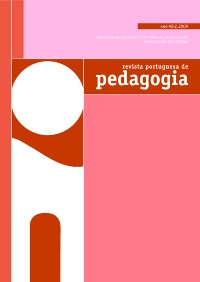Please use this identifier to cite or link to this item:
https://hdl.handle.net/10316.2/5564| Title: | Educação social para crianças em situação de rua no Brasil | Authors: | Schirò, Eva Diniz Bensaja dei Koller, Silvia Helena Paludo, Simone dos Santos |
Keywords: | Social education;Street children;Open school;Educação social;Crianças de rua;Escola aberta | Issue Date: | 2009 | Publisher: | Imprensa da Universidade de Coimbra | Abstract: | Este artigo tem como objectivo apresentar a relação das crianças e adolescentes
brasileiros em situação de rua com a escola, como um espaço de
educação social. São apresentadas as modificações que ocorreram no sistema
escolar público no Brasil, ao longo do século XX, e as repercussões nas
vidas destas crianças até a atualidade. A escola e as necessidades da sua
população-alvo mostraram-se discordantes. São apresentados estudos brasileiros
que mostraram como a importância da escola foi reconhecida formalmente,
contudo quem não tira dela benefício direto? Por esse motivo a
frequência escolar acaba por ser trocada por actividades asseguradoras das
suas necessidades primárias. Além disso, foi também mencionada por estes
estudos a dificuldade de integração de crianças em situação de risco social
e pessoal na comunidade escolar tradicional. É neste contexto que aparece
no sistema de ensino brasileiro a “escola aberta”, com um sistema de ensino
flexível adaptado à rotina e às necessidades da criança que vive na rua.
Estas escolas têm como objectivo a transição dos seus estudantes para o
sistema formal de ensino. A escola deve ser considerada como um espaço
de desenvolvimento, no qual seja conciliado o lúdico e o pedagógico. Já que as crianças esperam mais da escola do que apenas adquirir conhecimentos,
é necessário que esta as encare como seres de direitos inseridos ecologicamente
num contexto de desenvolvimento. Os vários elementos deste contexto
escolar devem integrar a transformação e a aprendizagem. This paper aims to present Brazilian street children and adolescents relationship the school system, as a space of social education. There are presented the modifications that happened in the public school system in Brazil, along the century XX and the repercussions in these children’s lives to the present time. The school and the needs of this target population showed divergent ways. Some Brazilian studies are reviewed, showing the formal importance of the school given by children; however they do not seem to have found any direct benefit. For that reason, the school frequency has been changed for activities that insured their primary needs. Besides, it was also mentioned by these studies, the difficulty of at risk children’s integration in the traditional school community. In this context, the “open school” appears in the Brazilian education system, with a flexible education system adapted to the routine and to the street child’s needs. These schools have as objective their students’ transition for the formal system of teaching. The school should be considered as a developmental space, in which it is reconciled its playful and its pedagogic roles. Since the children wait more of the school than just to acquire knowledge is necessary that it faces them as beings with their rights and ecologically engaged in a development context. The several elements of this school context should integrate the transformation and the learning. |
URI: | https://hdl.handle.net/10316.2/5564 | ISSN: | 1647-8614 |
| Appears in Collections: | Revista Portuguesa de Pedagogia |
Files in This Item:
| File | Description | Size | Format | |
|---|---|---|---|---|
| 04_educa__o_social_para_crian_as....pdf | 264.05 kB | Adobe PDF |  |
Items in DSpace are protected by copyright, with all rights reserved, unless otherwise indicated.
